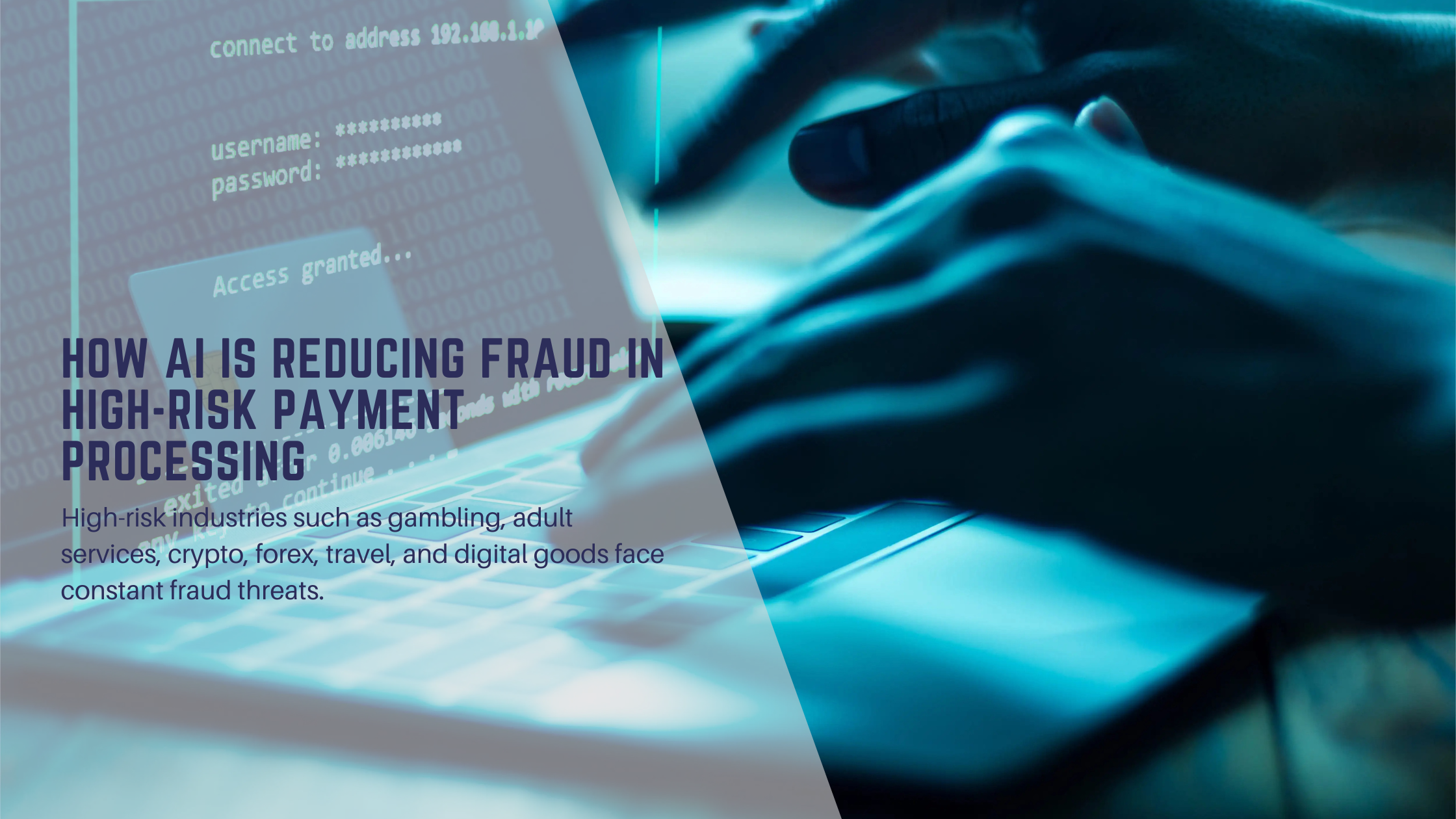February 8, 2026

-
Written by: Merchant Connect UK
- November 11, 2025
High-risk industries such as gambling, adult services, crypto, forex, travel, and digital goods face constant fraud threats. Chargebacks, identity theft, account takeovers, and fake transactions can cost businesses millions every year. Traditional fraud prevention methods are no longer enough — especially as criminals become more sophisticated.
That’s where Artificial Intelligence (AI) is transforming payment security.
AI-driven fraud prevention tools analyse thousands of data points instantly, detect suspicious behaviour in real time, and prevent fraudulent transactions before they happen. For high-risk merchants, this technology provides faster, smarter, and more reliable protection.
Why Fraud Is Such a Challenge for High-Risk Merchants
High-risk sectors deal with:
Larger transaction volumes
More frequent chargebacks
Higher customer dispute rates
Stricter card scheme scrutiny
More advanced fraud attempts
Because of this, traditional fraud filters produce too many false declines — blocking genuine customers. AI reduces these issues while keeping approval rates high.
How AI Detects Fraud in Real Time
AI systems constantly learn from new data. They identify patterns that would be impossible for humans or basic software to spot.
AI monitors factors such as:
Device fingerprinting
Behavioural patterns (mouse movements, typing speed)
IP geolocation changes
Sudden spending spikes
Unusual login activity
Card testing attempts
If something looks suspicious, the system flags or blocks it instantly — stopping fraud without slowing down legitimate transactions.
Machine Learning Improves Accuracy Over Time
Machine learning (ML) models don’t rely on static rules. Instead, they improve with every transaction.
As fraud tactics evolve, ML adapts.
Benefits include:
Fewer false positives
Higher approval rates
Smarter risk scoring
Reduced manual reviews
For merchants, this means better conversion rates and happier customers.
AI Helps Reduce Chargebacks
Chargebacks are one of the biggest threats to high-risk merchants. Too many can lead to fines, frozen funds, or terminated accounts.
AI supports chargeback reduction by:
Detecting friendly fraud
Validating customer identity
Predicting dispute likelihood
Flagging risky behaviour early
Some solutions can even challenge chargebacks automatically using rich data evidence.
AI Strengthens Compliance Standards
High-risk merchants often operate across multiple jurisdictions. Anti-Money Laundering (AML) and Know-Your-Customer (KYC) rules can vary by country.
AI assists with:
Identity verification
Document scanning
Sanctions/PEP screening
Transaction monitoring
By automating compliance, merchants reduce human error and avoid regulatory penalties.
AI Improves Customer Experience
Unlike manual reviews, AI checks transactions instantly, meaning:
Faster deposits
Faster withdrawals
Less friction at checkout
In competitive industries like iGaming, speed can determine whether a player depos
How AI Helps PSPs and Acquirers Underwrite High-Risk Merchants
Payment providers use AI to evaluate:
Business models
Processing history
Chargeback ratios
Website compliance
Transaction behaviour
This allows more merchants to be approved safely, instead of being rejected by traditional banks.
Practical AI Tools in High-Risk Payment Processing
Common AI-powered technologies include:
Behavioural biometrics
Device intelligence
Velocity checks
Transaction scoring
Adaptive rules engines
Bot detection
Each layer adds stronger protection without slowing down payments.
The Future of AI in High-Risk Payments
Over the next few years, AI will continue improving:
AML automation
Real-time risk scoring
Customer identity verification
Multi-currency fraud detection
As fraudsters use AI themselves, advanced models will become essential — not optional.
Why Work With Merchant Connect
As a leading UK and EU payment provider for high-risk merchants, Merchant Connect offers:
✅ AI-powered fraud solutions
✅ Global acquiring bank partnerships
✅ Chargeback prevention tools
✅ Advanced KYC/AML compliance
✅ Multi-currency processing
✅ Faster approval rates
We help merchants reduce risk, improve security, and protect revenue.
Final Thoughts
Fraud will always be part of online payments — especially in high-risk sectors. But with AI, businesses can finally stay ahead of evolving threats.
If you’re struggling with:
Chargebacks
Declined payments
Fraud attempts
Compliance requirements
Merchant Connect can help.
👉 Contact our team today to explore AI-driven fraud prevention designed for high-risk businesses.
Categories
- Banking(16)
- IBAN(2)
- Industry Insights(39)
- Merchant Account(8)
- Online Payments(20)
Recent Post
January 17, 2026
What Is an IBAN? A Simple Explanation for UK &
December 4, 2025
